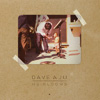After the origami-funk of 2008’s Open Wide — a surprisingly rich record of grayscale grooves comprised entirely of mouth-made sounds — the stage was set for San Fransico’s Dave Aju, although what he would perform on it was unguessable. With 2011’s single All Together Now he transcended the bit-crushed fidget-tech of The Unorthodoctor EP and the grainy percussive blasts of The Tables Turn to offer up a euphoric slice of sharp-edged house that was to become the blueprint for Heirlooms, an album of deep, chic, cosmic sludge that bounces joyously through influences that vary from sandpaper-smooth hip-hop to drifting ochre jazz.
From opener, “Rise,” revelatory pads fan out around Aju’s easy, funk-shy flow across to the hypnotic, Technotronic stabs of “To Be Free.” The percussion is nuanced, with crystal tambourines and tire track bass lines, fills in which hi-hats wrap around taps and hits that jolt and swim around the stereo field with luxurious complexity. There are suggestions of Booka Shade, Brazilian flavors, and the clarity and swagger of Detroit Swindle, but the true scope of the influences on hand is geographically daunting. Latin vibes abound in “MS Reposado,” calypso flavors on “Brown & Blue,” and populist boogie in the form of “Caller #7” — a radio-friendly hit featuring Jaw from dOP with playful horn slices that Aju takes to bits in a comic outro. Importantly, Aju’s voice is peppered throughout, almost as present as it was on Open Wide, occasionally bursting through into full-on pop hooks. It provides the album with a friendliness quite unlike the god-like, anonymous spoken word samples we expect from house music. “Freedom is free of the need to be free,” he sings on “To Be Free,” and also “Fried ice-cream is a reality”; the sense of humor he reveals in interviews is apparent in the music, as is a marked spirituality by the time the sluggish FlyLo stomp of “Revealing” rolls by.
It’s an hour-long setlist that Circus Company must have been delighted with. So stylishly does it sit alongside the ideas of label-mate Nicholas Jaar, at times even threatening to do for deep house what Jaar has done for musique concrète. Just as Jaar found beauty in the most incidental found recordings, Heirlooms makes length and generous repetition seem like the only sensible options for dance music to take. But despite the fact this is clearly the sound of an auteur at work, there remains an insistence on modesty. Although the concept of the record is one of remembrance (of Joe Barrite, Aju’s late father and Bay Area jazz musician) it is anything but weighty. There is an everyday bravery at work, a working through and documentation of time. Even at the emergence of lost memories (such as the foggy city-view sax that opens the album) each of Aju’s compositions is insistent on getting right down to it.
















